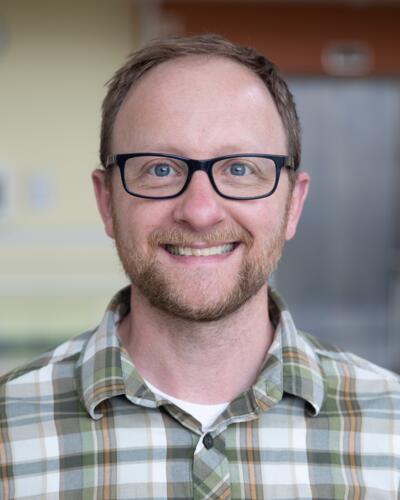Dr. Robert Feissner has been a member of the Geneseo faculty since 2011.

Office Hours Fall 2024
- Wednesdays 12:30pm-1:30pm ISC 232
- Fridays 11:30am-12:30pm ISC 232
Curriculum Vitae
Education
NYS Teacher Certification in Adolescent Education (Biology and Special Education), Nazareth College, 2010
Ph.D. in Biology, Washington University in Saint Louis, 2006
B.S. in Biology, SUNY College of Environmental Science and Forestry, 1998
Employment
Previously taught at Nazareth College
Laboratory instructor
Affiliations
Science Teachers Association of New York State
National Science Teachers Association
Research Interests
Cytochrome c biogenesis
Mitochondrial physiology
Publications
Feissner, R.F., Skalska, J., Gaum, W.E., and Sheu, S-S (2009) Crosstalk signaling between mitochondrial Ca2+ and ROS. Front. Biosci, 14: 1197-1218.
Richard-Fogal, C.L., Frawley, E.R., Feissner, R.E., and Kranz, R.G. (2006) Heme concentration dependence and metalloporphyrin inhibition of the system I and II cytochrome c assembly pathways. J Bacteriol, 189(2): 455-463.
Feissner, R.E., Richard-Fogal, C.L., Frawley, E.R., and Kranz, R.G. (2006) ABC transporter-mediated release of a heme chaperone allows cytochrome c biogenesis. Mol Microbiol 61(1): 219-231.
Feissner, R.E., Richard-Fogal, C.L., Frawley, E.R., Loughman, J.A., Earley, K.W., and Kranz, R.G. (2006) Recombinant cytochromes c biogenesis systems I and II and analysis of heme delivery pathways in Escherichia coli. Mol Microbiol 60(3): 563-577.
Feissner, R.E., Beckett, C.S., Loughman, J.A., and Kranz, R.G. (2005) Mutations in cytochrome assembly and periplasmic redox pathways in Bordetella pertussis. J Bacteriol 187: 3941-3949.
Feissner, R.E., Xiang, Y., and Kranz, R.G. (2003) Chemiluminescent-based methods to detect subpicomole levels of c-type cytochromes. Anal Biochem 315: 90-94.
Classes
-
BIOL 119: Gen Bio-Diversity,Physiol,Eco
An introductory course in the biological sciences covering animal diversity, animal biology, plant biology, and ecology. Counts for general education only when taken with BIOL 120.
-
BIOL 120: General Biology Laboratory II
An introductory experience which develops laboratory and analytical skills in the biological sciences. Students will learn introductory statistical analysis, oral communication, and techniques of applied research.